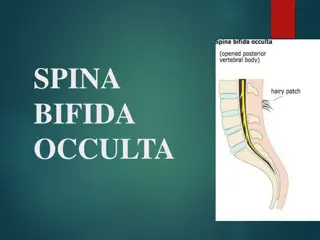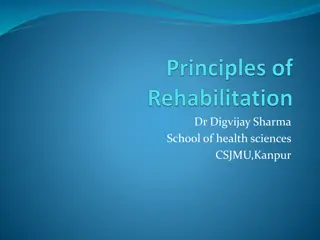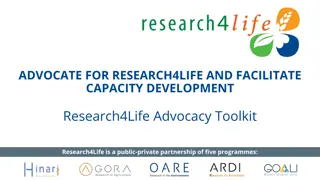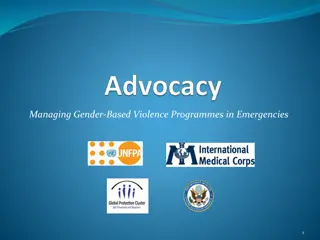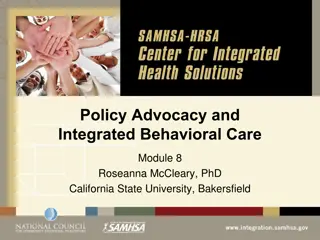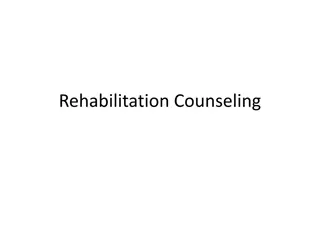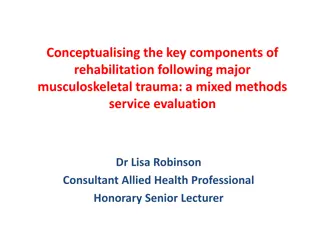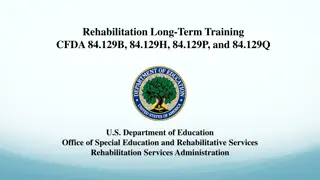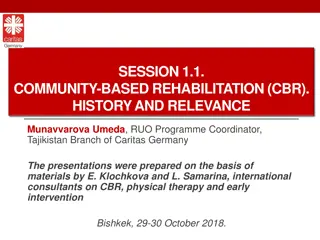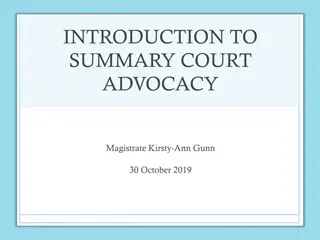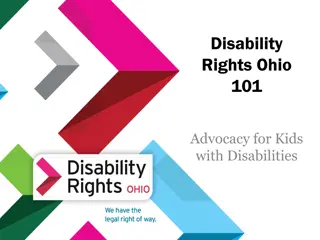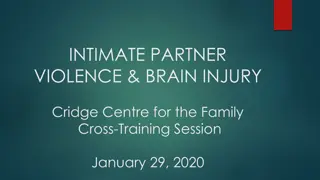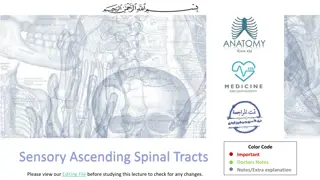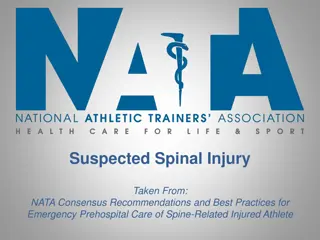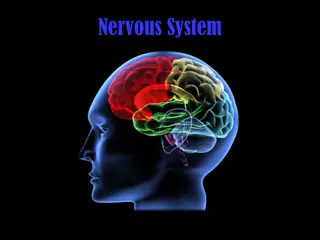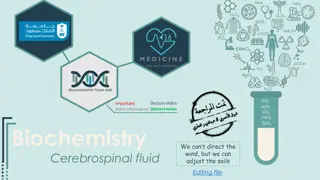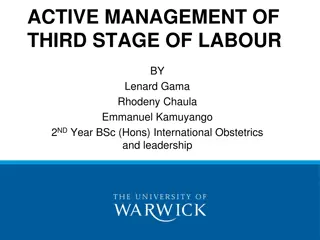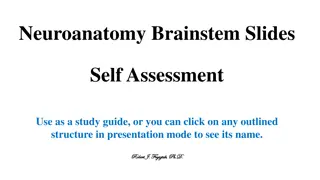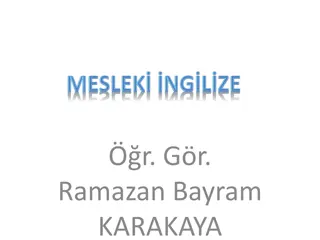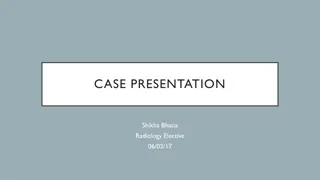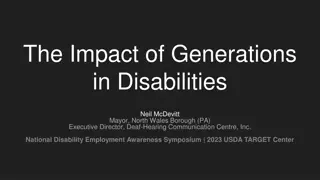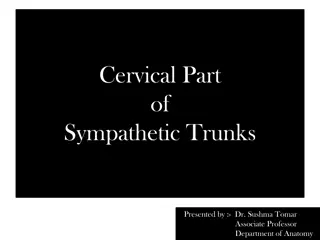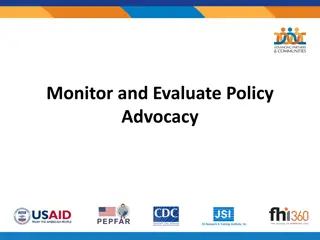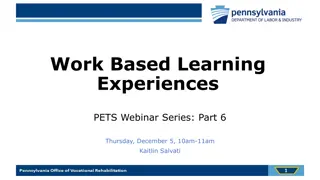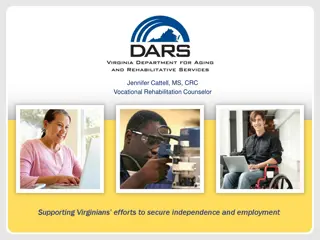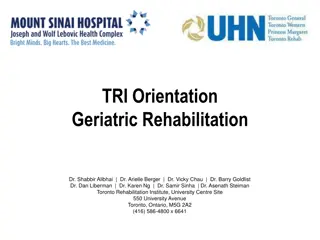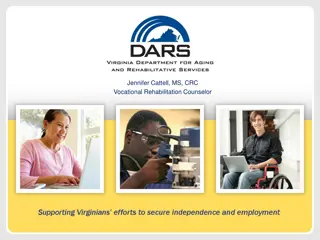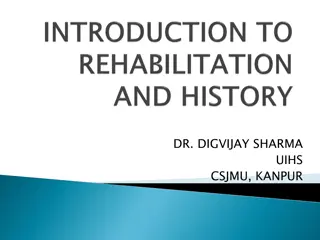Maximizing Spinal Cord Injury Rehabilitation: Insights and Advocacy Efforts
Explore the journey of spinal cord injury rehabilitation, challenges faced, and advocacy efforts by organizations like United Spinal Association. The impact of sudden onset spinal cord injuries on various aspects of life is highlighted, along with the importance of support and legislative advocacy. Join the Rolling Revolution at events like Roll on Capitol Hill to address issues affecting individuals with spinal cord injuries.
Download Presentation

Please find below an Image/Link to download the presentation.
The content on the website is provided AS IS for your information and personal use only. It may not be sold, licensed, or shared on other websites without obtaining consent from the author. Download presentation by click this link. If you encounter any issues during the download, it is possible that the publisher has removed the file from their server.
E N D
Presentation Transcript
Maximizing Spinal Cord Injury Rehabilitation: What Has Happened to Rehabilitation? Jennifer Hastings PT PhD NCS May 31, 2018 3:00-4:00pm ET
Presenters Presenters Jennifer Hastings, PT, PhD Board Certified Neurologic Clinical Specialist Professor, School of Physical Therapy University of Puget Sound Alexandra Bennewith, MPA Vice President, Government Relations United Spinal Association 2
United Spinal Association United Spinal Association United Spinal Association is dedicated to enhancing the quality of life of all people living with a spinal cord injury or disease (SCI/D). www.unitedspinal.org https://unitedspinal.org/action-center/ Advocacy Federal and State Roll on Capitol Hill Resource Center New Mobility Membership Magazine Chapters, Support Groups, Rehabilitation Facilities & Hospital Partners Products & Service Directory Accessibility Services VetsFirst 3
Roll on Capitol Hill Roll on Capitol Hill #ROCH2018 #ROCH2018 Join the Rolling Revolution: Roll on Capitol Hill is United Spinal s annual legislative advocacy event that addresses issues that impact the health, independence and quality of life of individuals living with spinal cord injuries and other paralyzing conditions. Approx. 150 members from across the country advocate for legislation that improves the quality of life for people with spinal cord injuries and other paralyzing conditions. Issues to be discussed include: Improve Air Travel for Passengers with Disabilities Protect the Americans with Disabilities Act Save healthcare benefits: prescription drugs; assistive and rehab technologies; medical supplies as well as community supports and services Improve disabled veterans life insurance Support VA Choice Program veterans community provider healthcare https://www.unitedspinal.org/events/roll-on-capitol-hill/ 4
What happens with a sudden onset spinal cord injury? Loss of Walking General moving around- personal independence Challenges to circulation, respiration and skin health 5
What happens with a sudden onset spinal cord injury? Changes in bowel and bladder function Sexual ability is changed Body Image and self worth are challenged Challenges to relationships 6
What happens with a sudden onset spinal cord injury? Immediate financial challenge Accessing one s living space Transportation challenges Challenges with return to work 7
Comprehensive Rehabilitation after SCI Should address ALL of these issues 8
Rehabilitation Means Return to Life As LIVED 9
AFTER SCI LIVE! (don t just survive) THRIVE! 10
Poll Question 1 Poll Question 1 "Do you think you left inpatient rehabilitation with all the skills you needed for success at home?" Yes No 11
Rehabilitation Should be delivered by a TEAM of experts working together Physicians: rehab medicine, urology Therapists: physical, occupational, speech, recreation Social Work and Psychology Rehab Nurses 12
Education This should be a key component of Rehabilitation Understand their care needs and direct anything they cannot do Autonomic Dysreflexia Health, wellness and weight management 13
Equipment Appropriate equipment for safe function at home Appropriate bladder management Padded bathroom equipment that the individual has the skills to use An appropriately sized and configured wheelchair Safely egress in an emergency 14
Poll Question 2 Poll Question 2 Were you able to receive the appropriate evaluation and equipment for your needs? Yes No 15
Length of Inpatient Rehabilitation Length of Inpatient Rehabilitation Stay following a C6-C7 SCI and the Effects on Wellness, Function, and Community Participation Jennifer Hastings PT, PhD, NCS; Kelly C. Gillespie SPT; Rachel V. Harris SPT; Michael R. Murphy SPT In 2011 we presented findings from a cross sectional study We collected current function, wellness and participation We collected date of injury and LOS for inpatient rehabilitation For 39 respondents the median inpatient rehab LOS was 150 days Currently 34 days (SCI Facts and Figures- 2018) 17
Note: in 2010 an individual injured in 1970 was living with SCI for 40 years! 18
Mobility Mastery of wheelchair skills is vital to full community participation Mobility transitions after rehabilitation Ambulation wheelchair vs. Wheelchair ambulation 20
LOS Looking at improvement in function between 6 mo and 1 yr post SCI identified increased LOS in inpatient rehabilitation as the single most important predictor for improving function Chatta et al, Topics of Spinal Cord Injury Rehabilitation 2018, Vol 24 Sup. 1 p 126 Independence in Mobility significantly correlated with QOL Goulet & Mac-Thiong, Topics of Spinal Cord Injury Rehabilitation 2018, Vol 24 Sup. 1 p 127-128 21
Requirements for Inpatient Rehabilitation Need intensive therapy minimum 3 hrs/day 5 days a week Multidisciplinary specialists Fulltime access to or close supervision by a physiatrist Continuous or full time rehabilitation nursing Medicare maximum of 100 days 22
Insufficient rehabilitation The MYTHOLOGY of outpatient care Inadequate professionals 23
Poll Question 3 Poll Question 3 Immediately after discharge from inpatient rehabilitation, were you able to access outpatient therapy at least three times a week? Yes No 24
What is needed? A RETURN to inpatient rehabilitation being the place where skills for self management after SCI are learned prior to discharge All aspects of psychosocial and physical management The time in rehabilitation should be determined by progress toward appropriate goals Shift the language from full time rehab nursing to Multidisciplinary Team of Specialists 25
What is needed? we need to prove that this will give better outcomes Less rehospitalizations Fewer wounds Higher return to work 26
QUESTIONS QUESTIONS Jennifer D Hastings: jhastings@pugetsound.edu Alexandra Bennewith: abennewith@unitedspinal.org Bill Fertig: bfertig@unitedspinal.org 27


